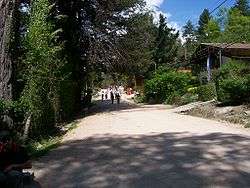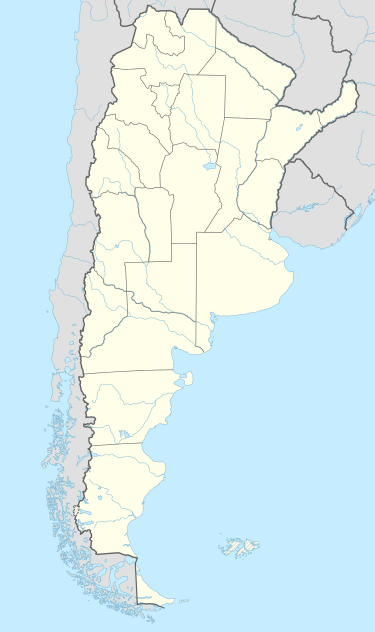La Cumbrecita
| La Cumbrecita | |
|---|---|
| Hamlet | |
 | |
 La Cumbrecita Location of La Cumbrecita in Argentina | |
| Coordinates: 31°53.90′S 64°46.40′W / 31.89833°S 64.77333°WCoordinates: 31°53.90′S 64°46.40′W / 31.89833°S 64.77333°W | |
| Country |
|
| Province | Córdoba |
| Department | Santa María |
| Elevation | 1,450 m (4,760 ft) |
| Population | |
| • Total | 189 |
| Time zone | ART (UTC-3) |
| CPA base | X5194 |
| Dialing code | +54 03546 |
La Cumbrecita is a small picturesque, secluded alpine-like hamlet, located amongst spruce and pine, at 1,450 metres (4,757 ft) above sea level, where it is not unusual to see a blanket of snow in winter time. It is situated in the Calamuchita Valley in the Grand Sierras of Córdoba, Argentina. A 30 kilometres (19 mi) paved road, up through scenic views of the Sierra Grandes will take you to La Cumbrecita.
The Medio river borders La Cumbrecita and is the edge of Santa María County. The INDEC 2001 census counted 189 inhabitants in La Cumbrecita and 156 in Calamuchita, totaling 345 inhabitants. 140 houses are nestled among the trees (97 and 43 in each county).
Geography

This small town is about 40 kilometres (25 mi) (depending on the route chosen) to the west of Villa General Belgrano and 118 kilometres (73 mi) from the capital city of Córdoba. Excursions to La Cumbrecita can be taken from nearby Villa General Belgrano, founded by the crew of the German cruiser Admiral Graf Spee,[1] if the visitors don't have their own transportation.
Administratively, the town is organized as a commune. It was officially founded on 9 September 1934,[2] when the Cabjolsky family bought 500 hectares (2 sq mi) and brothers Enrique and Federico Behrend started their pioneer work. There were no roads then, and everything had to be brought in by donkey. Federico planted the pine trees and so transformed the countryside into an Alpine environment. He also took care of the farm used to lodge the animals which wandered through the open fields. His brother Enrique made the road to Los Reartes and constructed the first houses.[2]
Tourism
Tourism started in earnest in 1937 with the first visitors making their way to the hidden town. Around 1940, the first private homes were built and the town slowly acquired the Tirolés character that defines it today.
Populated by central European immigrants, the town is focused on eco-tourism. It is completely pedestrian and reminiscent of the small German towns of the fifteenth century. One can hike up through the town (and then down) to the waterfall, a truly paradisiacal experience. Teahouses specialize in Apfelstrudel and Chocolate cake. Alpine-style hotels, lodgings and cabins are available, and with permission, camping may be anywhere. The Mineral Museum has a large gem and mineral collection from all over the world.
The communal authorities declared the zone a protected environment and as of 1996 a "Pedestrian Town". Visitors must park their cars in the parking lot before the town entrance and then walk along the stone-paved streets.
See also
References
- ↑ Leitner, Gerry (2001). Argentina Travel Companion. Hunter Publishing, Inc. p. 331. ISBN 0-9587498-1-7.
- 1 2 Besana, Sergio Restelli (2006). La Cumbrecita (in Spanish). Editorial Dunken. p. 21. ISBN 987-02-1632-3.
External links
| Wikimedia Commons has media related to La Cumbrecita. |